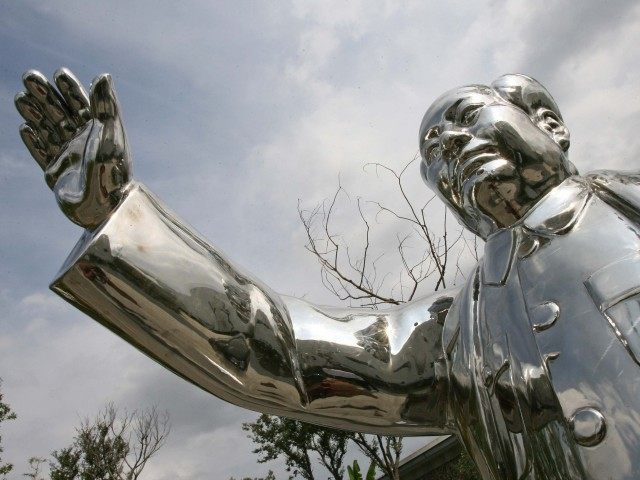The People’s Bank of China has devalued the yuan 2.9 percent since Monday–the biggest plunge in the currency’s value since the mid-1990s. China’s currency devaluation is a classic predatory trade war action to save up to 60 million Chinese factory jobs at the expense of millions of American and European workers.
The Chinese “economic miracle” was a result of negotiations with the Western Powers as the Soviet Union collapsed in the early 1990s. With its key communist trading partner imploding, the West enticed China to abandon rigid communism and flirt with capitalist trade by allowing China to competitively devalue its currency from 2.8 yuan to 5.3 yuan to the dollar.
Facing economic crisis and potential famine in 1994, China embraced capitalism as “Socialism with Chinese Characteristics”. The West allowed China’s exchange rate to be devalued to 8.1 yuan per dollar, and corporate tax rates were set at an average of 40 percent less than the average of U.S., Europe and Japan, without erecting new tariffs.
Combining a 66.6 percent currency devaluation, dramatically lower tax rates, and tariff-free trade fueled China’s economic boom. Over the next fifteen years, China’s economy quadrupled as incredibly cheap labor costs meant importing manufacturing jobs from the West. In the West, the U.S. economy doubled, Europe grew by 50 percent, and Japan had no growth.
Democrats swept the 2006 midterm elections partly due to popular anger at 7 million, or about 40 percent, of American manufacturing jobs being exported to China. The Bush Administration sent Treasury Secretary Hank Paulson to Beijing to force China to “re-value” up the yuan’s exchange rate by 32 percent, to 6.1 to the dollar.
But the move also halted China’s recycling of its cash flow into U.S. Treasury bonds abruptly. As a result, rising U.S. interest rates helped cause the real estate crash that led to the 2008 financial crisis.
The West and China tried to recover from the Great Recession through massive monetary expansion. Although China appeared to be the winner over the next six years, most of its success was powered by a 250 percent increase in state-owned-bank lending to state-owned-enterprises and local government. At least a third of all large Chinese borrowers, and about half of the Chinese provinces, are now seriously insolvent.
But China also now faces an existential threat from America’s fracking boom, which has sent the cost of U.S. natural gas to less than a third of world prices. Given that energy is about 13 percent of manufacturing input costs, and labor is only about 8.5 percent of input costs, communist China can give its labor away and still not be as competitive in basic industry manufacturing as the United States.
China tried to turn inward and stimulate its domestic economy with real estate and stock market booms. Over the last year, China sold $400 billion in U.S. securities holdings to fund what it hoped would be a domestic consumption boom. But that effort has collapsed since late June with the implosion of China’s stock markets.
By my analysis, every 10 percent movement in China’s exchange rate would add or subtract about 17 percent to or from China’s “processed” exports, respectively, and impact about 30 million jobs. To sustain its current export-led economy’s employment levels, China would need the yuan to depreciate by about 22 percent.
Breitbart News reported last week in “Inland Empire is America’s Fastest Growing Industrial Center” that the U.S. is in the front-end of a major industrial building boom. About one million manufacturing jobs have already been created, and millions are planned as multi-national corporations are abandoning China for a better cost structure in the U.S.
China knows its devaluation during a U.S. presidential campaign will create serious international confrontations. But the threat to the reign of the China Communist Party from the loss of tens of millions of jobs is forcing the Chinese authorities to act.

COMMENTS
Please let us know if you're having issues with commenting.